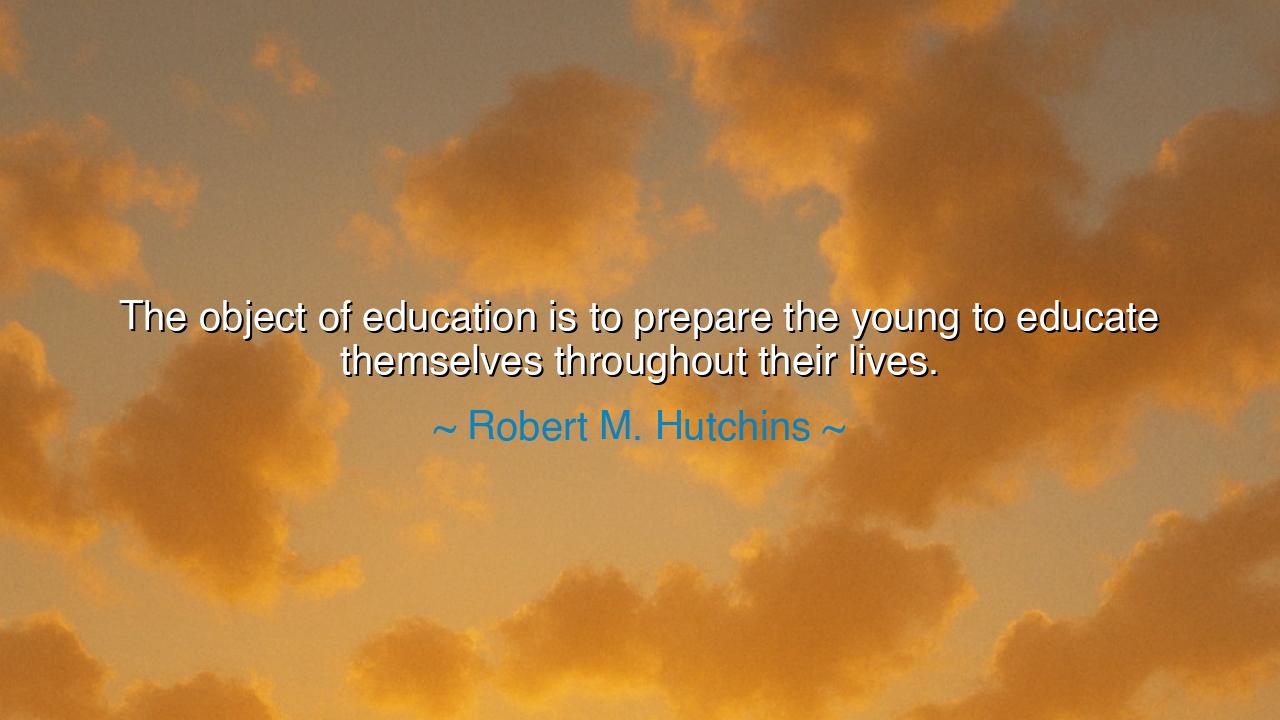
The object of education is to prepare the young to educate
The object of education is to prepare the young to educate themselves throughout their lives.






“The object of education is to prepare the young to educate themselves throughout their lives.” So spoke Robert M. Hutchins, the American philosopher and educator who believed that true learning was not the memorization of facts but the awakening of the mind. In these words lies a truth as ancient as the hills, yet as urgent as the dawn — that education is not an end, but a beginning; not a vessel to be filled, but a flame to be kindled. The wise do not seek to make the young merely knowledgeable; they seek to make them curious, restless, and self-driven — forever hungry for truth. For when the teacher steps aside, only those who have learned how to teach themselves will continue to grow.
Hutchins lived in the twentieth century, a time when schools were turning into factories and learning into routine. He saw young minds filled with data, but starved of wisdom; graduates who could recite, but not reason. Against this tide, he spoke with the voice of the ancients. He taught that the purpose of education was not to create obedient workers or passive citizens, but thinkers — people who could question, explore, and renew the world through their own discovery. To him, the greatest gift a teacher could give was not knowledge, but the power of self-education — the ability to learn long after the classroom has disappeared.
This idea echoes through history. The philosopher Socrates, walking barefoot through the streets of Athens, refused to lecture or dictate. Instead, he questioned, guiding his students to think for themselves. He knew that wisdom cannot be inherited; it must be forged through one’s own struggle to understand. When he asked, “What is virtue?” or “What is justice?” he was not seeking answers, but awakening minds. That is the essence of Hutchins’ teaching — that true education does not pour knowledge into a passive soul, but stirs the spirit into eternal movement. It teaches not what to think, but how to think, and thereby gives the student mastery over their own growth.
Consider also the life of Leonardo da Vinci, who was largely self-taught. He studied anatomy without a teacher, sketched the flight of birds, designed machines centuries ahead of his time, and explored the mysteries of water and wind. No school could have contained such a mind, because Leonardo had learned the art of educating himself. His curiosity was his compass, his persistence his mentor. His example stands as living proof of Hutchins’ wisdom: once a person learns how to learn, their education never ends. Such a person does not fade into ignorance after youth — they become a lifelong apprentice of truth.
But Hutchins’ message is not only about the pursuit of knowledge; it is about freedom. The one who depends on others to think, to guide, to decide, is forever a servant. The one who learns to educate themselves becomes free — free to explore, to question, to shape their destiny. This is why all tyrannies fear true education: because it teaches individuals to stand on their own minds. A nation of self-educating citizens cannot be deceived or controlled; it will always renew itself. Thus, to teach someone how to learn is to give them the greatest armor against ignorance and oppression.
Yet how few understand this sacred duty! Too many teachers still believe that their task is to fill the mind, not awaken it. Too many students think of education as a burden, not a privilege. Hutchins reminds us that the role of the teacher is like that of the gardener — to nurture, not to dictate; to prepare the soil so that the seed of curiosity may grow wild and strong. Once the roots take hold, the teacher may depart, and the plant will still reach for the sun. So must the wise educator prepare the young to teach themselves, to become seekers of truth, explorers of knowledge, and masters of their own minds.
So, my listener, let this wisdom guide you: whether you are young or old, never cease to be a student. Do not wait for others to teach you what you long to know. Read, question, listen, observe — and above all, reflect. Seek not the comfort of knowing, but the challenge of understanding. Build the habit of learning as others build the habit of breathing. For the true scholar carries no diploma but a restless mind; no classroom but the world itself.
And remember the words of Robert M. Hutchins — that the object of education is not to end curiosity, but to awaken it forever. The greatest teacher you will ever meet is yourself. When you learn to listen to that voice within — to its questions, its doubts, its hunger for truth — then your education will never end. You will walk through life as a torchbearer of wisdom, lighting the way not only for yourself but for all who follow.






AAdministratorAdministrator
Welcome, honored guests. Please leave a comment, we will respond soon